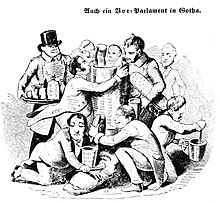Gotha post-parliament
Gothaer Nachparlament called a private meeting of 148 former deputies of the National Assembly in Frankfurt from June 26 to 28. June 1849 in Gotha . Most of them were left and right liberals of the hereditary imperial direction, who in March 1849 had voted for the Prussian king as German emperor. The best known were Hermann von Beckerath , Friedrich Christoph Dahlmann , Heinrich von Gagern , Jacob Grimm , Karl Mathy , Robert von Mohl and Eduard Simson . Others like Johann Gustav Droysen stayed away from the meeting in protest against Prussia.
In May 1849, Prussia had violently suppressed the revolution and illegally ordered the Prussian MPs to cease their activities for the National Assembly. In the same month Prussia invited the other German states to found a small German federal state ( Dreikönigsbündnis ). The spiritual father and driving force was Radowitz, an advisor to the Prussian King Friedrich Wilhelm IV. This attempt to form a German nation-state was later called the Erfurt Union .
The liberals in Gotha were now discussing whether they should support this path to becoming a federal state. Because of the previous experience with Prussia, there were definitely concerns. Liberals were also bothered by the fact that the constitution should be more conservative and federal than the Frankfurt constitution . Nevertheless, they agreed in principle to the path to the state indicated by Radowitz. The so-called "Bahnhofspartei" developed from the Gotha people and later had the majority in the Erfurt Union Parliament .
Gotha declaration
A declaration in which the Gotha post-parliament on June 28, 1849 spoke out in favor of the Prussian plan for a union of German states excluding Austria, became generally known as the "Gotha Declaration".
See also
supporting documents
- ↑ Manfred Botzenhart: German Parliamentarism in the Revolutionary Period 1848–1850. Droste Verlag, Düsseldorf 1977, p. 722.
- ↑ Peter Steinhoff: The "hereditary imperial" in the Erfurt parliament. In: Gunther Mai (Ed.): The Erfurt Union and the Erfurt Union Parliament 1850. Böhlau, Cologne u. a. 2000, pp. 369-392, here pp. 369/370.
- ^ Hans Friedl: Zedelius, Christian Karl Philipp Wilhelm. In: Hans Friedl u. a. (Ed.): Biographical manual for the history of the state of Oldenburg . Edited on behalf of the Oldenburg landscape. Isensee, Oldenburg 1992, ISBN 3-89442-135-5 , p. 820 f. ( online ).
